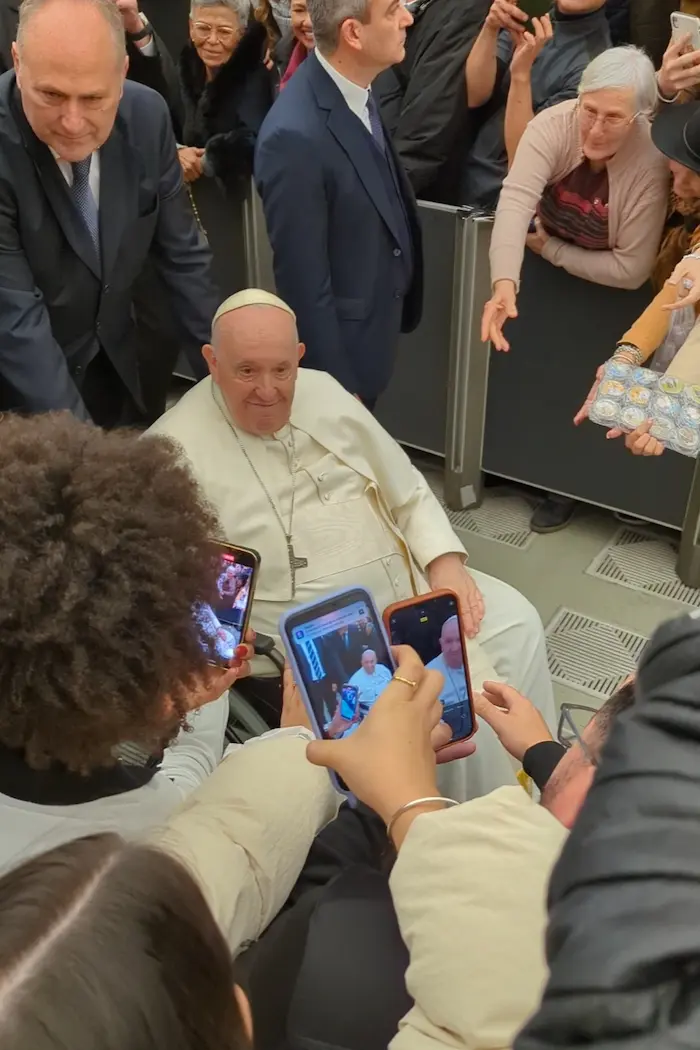
Pope Francis asked to be buried next to the Pauline Chapel, where the Marian icon Salus Populi Romani is housed within Rome's Basilica of St. Mary Major. His papacy was a continual witness to the reorientation of one’s life toward “the other.” He didn’t want to be buried in that chapel because he wanted the focus to be on Mary, our Mother—not a pope! For Pope Francis, God’s love was unconditional, expansive, and limitless, excluding no one. His humility inspired him to dream big for our world and our Church. His hope in God was greater than many could comprehend.
While this vision is one worth upholding, it was challenging for many to live out in their families and communities. His vision invited us to open our hearts to a horizon beyond our grasp—a horizon that cannot be contained, boxed in, or possessed within the clutches of fear, possessiveness, or consumerism. Pope Francis’s commitment to a culture of encounter and communion was grounded in his relationship with Jesus, which was evident throughout his ministry.
Pope Francis was present in places many leaders or people would choose not to go: poverty-stricken areas, prisons, Indigenous communities, war-torn countries, towns devastated by natural disasters, and in dialogue with those of other faiths and beliefs—particularly Lampedusa in 2013, which signaled his pastoral concern and shaped the course of his papacy. This was a man of God who bore witness to the very presence of God—God who is in our neighbors, our brothers and sisters, and especially in those most forgotten. His pastoral priorities reflected the heart of Jesus, who broke down barriers that kept people from experiencing God's mercy. Surely, his heart broke in these places of suffering. He was a pope who saw and wept for those who suffered. A pope moved with pity—just like Jesus. As Saint Oscar Romero said, “There are many things that can only be seen through eyes that have cried.”
When I reflect on my last eight years in diocesan ministry, I am struck by the influence of Pope Francis’s writings and his witness to God in my life. Christus Vivit (Christ is Alive), the post-synodal exhortation from 2018, laid the foundation for youth ministry. It gave language to the spirit of accompaniment, which has become the bedrock of youth ministry in the Diocese of Parramatta. For Pope Francis, accompaniment means removing one’s shoes before the sacred ground of another person. In my own striving for communion and alignment with God’s will, I have been consoled by his repeated invitations to notice and recognize God in everyone I encounter.
When I have responded openly to this call, I have been moved by the beauty and sacredness I experience in others' stories—their joys and their suffering. Often, I am brought to tears and reminded of my heart of flesh: human and in need of God. I have learned from Pope Francis’s faithfulness to those who suffer and how he looked upon them with eyes of compassion, not condemnation.
To me, Pope Francis encountered deep suffering in God's people across the world. He wept—and like Jesus—was drawn toward them without hesitation. I will carry this with me as I continue to ask God for mercy upon me, a poor sinner deeply desiring to do God’s will, praying for the courage to give my all. Pope Francis reminds me that he is just like us: he suffered, experienced joy, dreamed big, and longed for his life to reflect God’s deep and expansive love for all.
When he looked out at the millions of young people at the World Youth Days in Rio de Janeiro, Kraków, Panama City, and Lisbon, I believe his disposition was always one of solidarity—not as a hierarch, but as a brother. And when he proclaimed in Lisbon that the Church is for everyone—Todos, Todos, Todos—with full recognition of his own sinfulness, I believe he included himself in that “Todos” too. He was one of us.
Rest in peace, Pope Francis.
Contigo.


